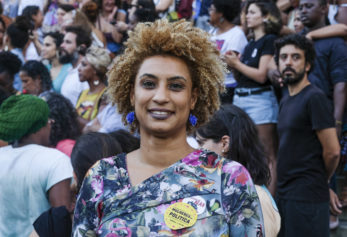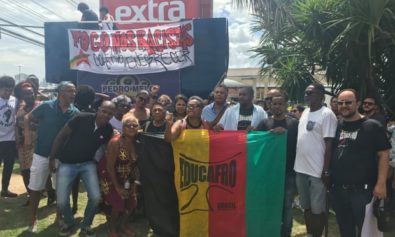In the wake of the recent protests in Brazil, known as the V for Vinegar Movement or Salad Revolt, and Brazilian Spring, Brazilians of African descent are demanding racial equality in the political and economic domains of the broader society.
Over the past three weeks, more than 1 million Brazilians, mostly middle-class Caucasians, have taken to the streets demanding cheaper transportation, better education and less corruption.
” What started as a student mobilization transformed day by day to incorporate professionals, the middle class, and residents of the favelas or slums. According to a survey by the Brazilian Institute of Opinion and Statistics, 79 percent of the protesters earn more than twice the minimum wage, and 76 percent are employed. Close to 40 percent of the protesters had not been born during similar massive protests in 1992. In those protests, university students mobilized to demand that then-President Fernando Collor de Mello step down. They remained in the streets until the president resigned amid corruption charges.” – CNN
Now tens of thousands of Afro-Brazilians are renewing the decades-old struggle for racial equality, and are staging protests to draw attention to their grievances.
“The “Revolta dos Turbantes (Revolt of Turbans)” captured and personified the voice of black protest on the streets of Rio during one of the largest protests of the week on June 20.
The list of demands to the state and to Brazilian society reflects the invisibility of blacks and the violation of their rights in various sectors of the country. These demands cover even basic rights, still nonexistent in some regions, such as access to health care, education and decent housing.
Among other specific demands of the black population, and in support of PEC of the Domestics (domestics law), protesters stand: against the extermination of black youth; for the demarcation and titling of Indigenous and Quilombo lands; for the effectiveness of Law 10.639/2003 and 11.645/2008 that established the mandatory teaching of African, Afro-Brazilian and indigenous history and culture in the school curriculum with respect of religiosity of African origin; for access to income and the labor market; against the removal of families in areas where there is real estate speculation; against the Statute of the Unborn; for the demilitarization of the PM (military police); against lowering of the age of being tried as criminals in court; and for the end of racism in SUS.” – Blackwomenofbrazil.co
Brazilian government officials are already working to respond to the demands of the middle-class protesters. It remains to be seen if they will respond to the issues raised by Brazilians of African decent who represent more than 50 percent of the total Brazilian population.


